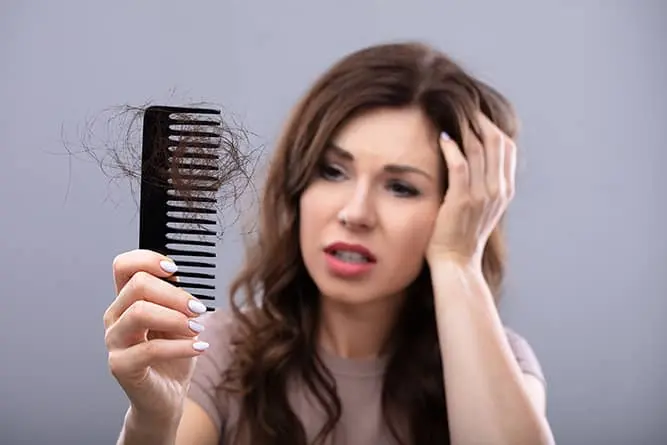It is fairly typical for hair to change the quality and volume over one's life. Realizing it might not make it any easier if your hair appears to be becoming thinner by the day. If your hair is thinning or falling out, you're probably wondering why. Is hair loss caused by stress, hereditary, or another factor? To all three, the answer is "yes."
You've probably heard that stress may trigger hair loss, and you'd be right. Whereas the first two reasons for hair loss are highly heritable, hair loss caused by stress is induced by the environment and may be more readily regulated if the stress is handled.106
What constitutes considerable mental stress? Consider a huge, bad life experience (i.e., the loss of a loved one or divorce). While a single poor day at work need not qualify, severe and sustained stress as a result of the COVID-19 epidemic, for example, may.
It has always been the case: Stress causes hair loss.
In the late 1990s, a study was conducted by York, Nicholson, Minors, and Duncan. Their case-control design was used to compare stress in the lives of 25 women who had recently experienced unexplained hair loss to those of 25 women who had not. High stress was reported by 22 of the women who had hair loss and 10 of the women who did not have hair loss. Women who are under a lot of stress are 11 times more likely to lose their hair, according to an odds ratio of 11. 107
High levels of stress can result in three types of hair loss:108
Telogen effluvium . It is caused by significant stress, and it causes a large number of hair follicles to enter a resting phase. After a few months, affected hairs may fall out unexpectedly when combing or washing your hair.
Trichotillomania . It is a compulsive desire to pull hair from your scalp, brows, or other parts of your body. Hair pulling can help people cope with negative or unpleasant emotions like stress.
Alopecia areata . It is thought to be caused by a variety of factors, including chronic stress. It is a condition in which the immune system of the body attacks the hair follicles, causing hair loss.
Can Hair Loss From Stress be Reversed?
Science aside, how can our understanding of the correlation between stress and hair loss help us prevent or restore hair loss?
Fortunately, if the hair loss is only related to stress, total recovery usually happens within several months to a year. There are several key actions you may take if you've experienced hair loss as a result of stress:
Eating a healthy & nutritious diet . According to research, stress-related hair loss can be caused by dietary deficits, such as ferritin, vitamin D, zinc, B12, and vitamin 3. The best foods for avoiding stress-induced hair loss are nutritious foods and a well-balanced diet. 109
Managing stress . At-home stress management approaches include meditation via yoga, deep inhalation, journaling, therapy, or counseling. 110
Take supplements . Supplements and hair care products can also provide support along the process. Regaine®, rich in minoxidil, an essential ingredient to hair growth, should provide you with the reversed effect of hair loss you need. 111
On a final note, Trüeb explains, hair loss is a common complaint that causes significant emotional distress, particularly in women. The most effective way to reduce anxiety is to effectively treat hair loss. Patients seeking advice may or may not be experiencing hair loss. Adequate psychological support and education about the basics of the hair cycle, as well as why significant patience is required for effective cosmetic recovery, are critical in reducing patient anxiety.112
References:
106 Hadshiew, I. M., Foitzik, K., Arck, P. C., & Paus, R. (2004). Burden of hair loss: stress and the underestimated psychosocial impact of telogen effluvium and androgenetic alopecia. Journal of investigative dermatology, 123(3), 455-457.
107 York, J., Nicholson, T., Minors, P., & Duncan, D. F. (1998). Stressful life events and loss of hair among adult women, a case-control study. Psychological reports, 82(3), 1044-1046.
109 Yau, Y. H., & Potenza, M. N. (2013). Stress and eating behaviors. Minerva endocrinologica, 38(3), 255.
110 https://my.clevelandclinic.org/health/treatments/6409-stress-management-and-emotional-health
111 https://health.clevelandclinic.org/the-best-vitamins-supplements-and-products-for-healthier-hair/
112 Trüeb, R. M. (2010). Systematic approach to hair loss in women. JDDG: Journal der Deutschen Dermatologischen Gesellschaft, 8(4), 284-297.

